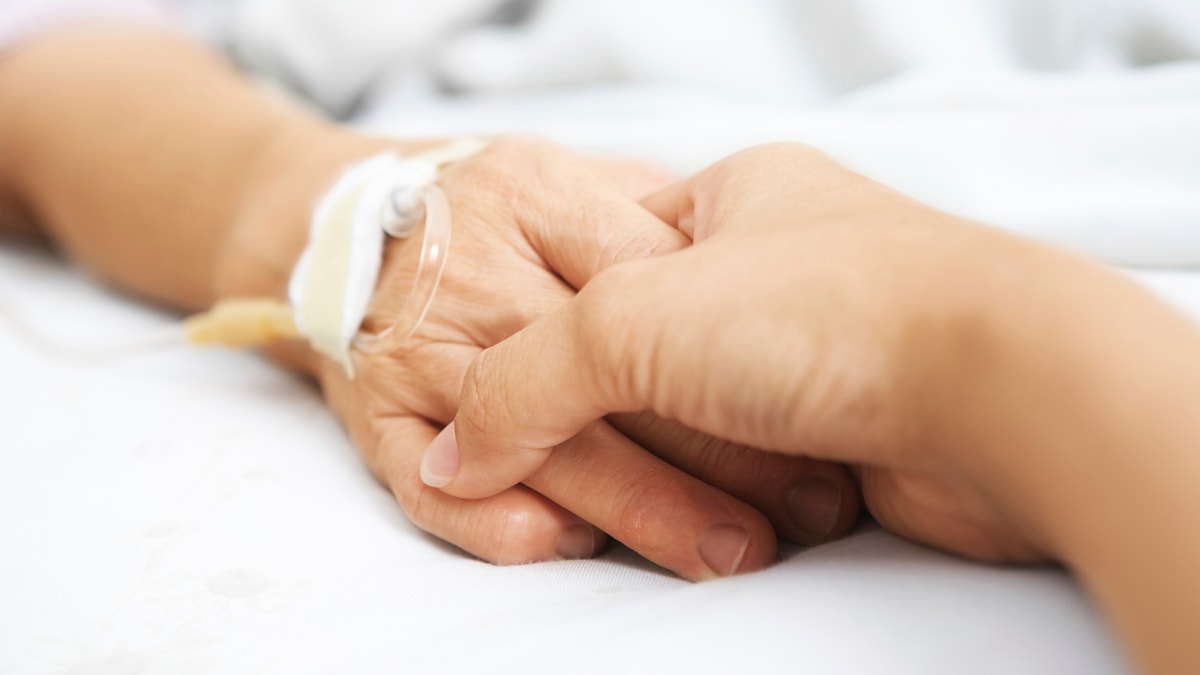
Daughter holding her mother hand, that injected with IV in hospital (©Rudyanto Wijaya)
Comfort care for advanced cancer patients is associated with fewer repeat hospitalizations and more hospice referrals, according to a study highlighting how this approach may offer chronically sick or terminally ill people a better quality of life.
Researchers focused on terminal cancer patients who often end up receiving a lot of care during their final months of life; all were already hospitalized for serious medical issues. The study team tested what happened to these patients before and after the start of a new palliative care consultation program in the hospital.
Palliative care aims to improve quality of life for seriously ill patients by relieving their symptoms and easing their stress.
"Patients who received inpatient palliative care consultations have improved quality of life, reduced intensive care unit utilization, longer stays in hospice and lower overall cost of care," said lead study author Dr. Kerin Adelson of Yale Cancer Center in New Haven, Connecticut.
"Despite this, many patients never receive palliative care," Adelson said by email. "Patients who do not receive palliative care are more likely to have medicalized deaths and receive unwanted, futile, interventions near the end of life."
Under the program tested in the study, cancer patients at Mount Sinai Hospital in New York City got consultations about palliative care options if they had advanced tumors, had been previously hospitalized in the past month, had been in the hospital for at least a week during their current stay or if they had active symptoms.
Consultation with the palliative care team included things like discussions about treatment goals, advance planning for end-of-life care and planning to transition patients out of the hospital. Care teams included a physician, nurse practitioner, social worker and chaplain.
Researchers compared what happened to 65 patients who qualified for this program during the study to outcomes for 48 patients in a "pre-intervention" group who were hospitalized before the program started but would have qualified for it.
Overall, 39 percent of patients in the pre-intervention group and 80 percent of the people in the program group received palliative care consultations, researchers report in the Journal of Oncology Practice.
The proportion of patients who had repeat hospitalizations within 30 days of being discharged dropped from 35 percent pre-intervention to 18 percent after the consultation program started.
Receipt of chemotherapy after discharge declined from 44 percent to 18 percent.
Beyond its small size, other limitations of the study include the focus on a single care team at one academic medical center with a previously well-established palliative care service, the authors note.
Some patients who could have received consults when the program was up and running also didn't get this opportunity because they were admitted on Fridays and staff wasn't able to do consultations over the weekend, researchers point out.
Still, the results suggest it is possible to make palliative care a more routine part of the hospital experience for people with serious illness, said Dio Kavalieratos, a researcher at the University of Pittsburgh who wasn't involved in the study.
"For patients living with serious illness and their families, palliative care offers an extra layer of support to help manage stress, suffering, and decision-making," Kavalieratos said by email. "Palliative care is appropriate for anyone with a serious illness, no matter where they are."
While palliative care isn't always available, patients and families should always speak up to find out about this option, said Joy Goldsmith, a public health researcher at the University of Memphis in Tennessee who wasn't involved in the study.
"Without a big picture, decisions about time spent in the hospital, side effects from chemotherapeutic agents, and place of care are never brought to the fore," Goldsmith said by email. Palliative care can help patients and families consider medical decisions in the broader context of what they most want for the time they have left rather than focusing only on a single test or treatment.
"Better outcomes equal the chance to take the whole person and their life into account, rather than staggering on the treadmill of the medical world," Goldsmith said.








































